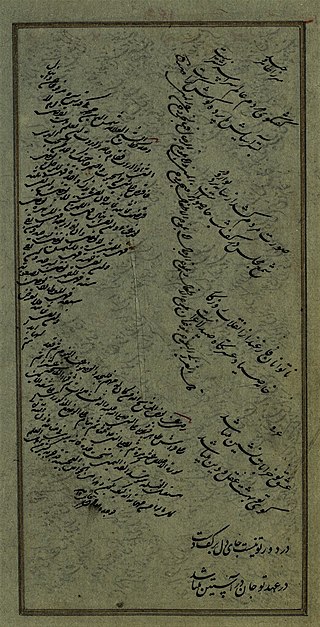
Heraclius I or Nazar Alī Khān (1642–1709), of the Bagrationi dynasty, was a Georgian monarch who ruled the kingdoms of Kakheti and Kartli (1688–1703) under the protection of the Safavid dynasty of Iran.

Fath-Ali Khan Qajar was the chieftain of the Ashaqa-bash branch of the Qajar tribe at Astarabad during the collapse of the Safavid dynasty of Iran.

Iranian Armenia (1502–1828) refers to the period of Eastern Armenia during the early modern and late modern era when it was part of the Iranian empire. Armenians have a history of being divided since the time of the Byzantine Empire and the Sassanid Empire, in the early 5th century. While the two sides of Armenia were sometimes reunited, this became a permanent aspect of the Armenian people.
Mohammad Beg, was a Muslim of Armenian origin, who served as the Grand Vizier of the Safavid king (shah) Abbas II from 1654 to 1661.
The Military of Safavid Iran covers the military history of Safavid Iran from 1501 to 1736.

Mirza Mohammad Taher Vahid Qazvini, was an Iranian bureaucrat, poet, and historian, who served as the grand vizier of two Safavid monarchs, Shah Suleiman and the latter's son Soltan Hoseyn from 1691 to 1699.
Aslamas Beg, also known as Aslan Khan, was a Safavid official and military commander of Georgian origin. A scion of the Orbeliani family, Aslamas was the second son of Vakhushti Khan, the former governor of Shushtar.

The province of Daghestan was a province of Safavid Iran, centred on the territory of the present-day Republic of Dagestan. Numerous high-ranking Safavid figures originally hailed from the province, or had roots there.
The Divan-begi was a high-ranking official in Judicial system of Safavid Iran (1501–1736), who acted as chief justice of Safavid capital and all over the kingdom's courts. It was the Persian form of Turkic Diwan-begi office, also known as the Imperial Chief Justice or Lord High Justice. Divan-begis presided over an appeals court for the kingdom, except for cases involving military officers or religious officials. Divan-begis had deputies to assist them.